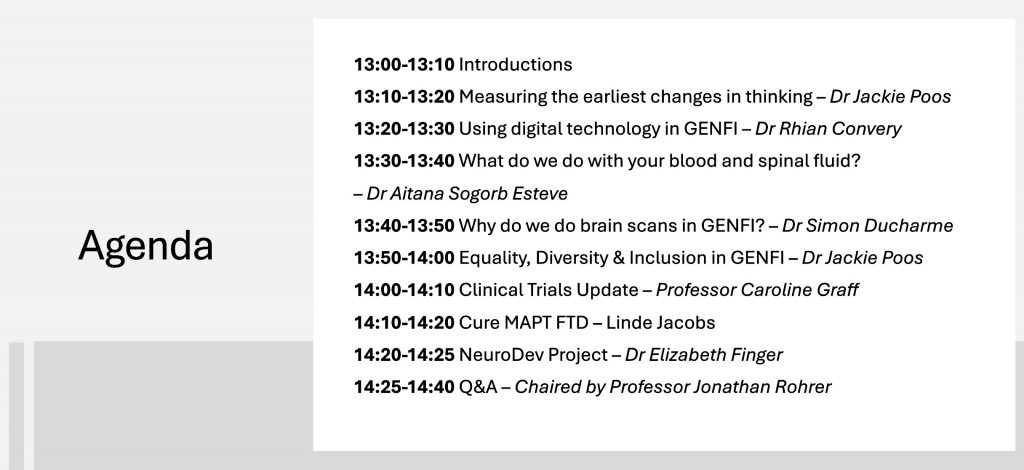On May 17th 2024, the genetic frontotemporal dementia initiative (GENFI) study team hosted the inaugural Spring Participant Webinar. Bringing together GENFI participants from across Europe and Canada, the meeting provided an overview of the ongoing research being conducted across the worldwide sites. The webinar featured a range of engaging topics and speakers (full agenda below), and included a Q&A session allowing participants to engage with the speakers.

Following the webinar, the team hosted the annual GENFI Participant Engagement Board (PEB) Meeting. For those unfamiliar with the PEB, the group consists of participants who volunteer their time to discuss upcoming clinical trials and provide feedback on the research study. The PEB plays a crucial role in GENFI, as it ensures their research is informed by those affected by frontotemporal dementia (FTD).
To provide a better understanding of the webinar and PEB meeting, we invited Jess Crawford, a participant and PEB member at the UK GENFI site, to share her key takeaways from the day. Here’s what she had to say:
I’m no stranger to writing about my experiences with FTD. In April 2020, I published my first ever blog on www.ftdandme.co.uk. At that time, I was feeling alone, trying to care for my mum who had advanced FTD, and questioning why there was so little information available about this disease. It’s the most prevalent form of dementia for those under 60 years old, why had I never heard of it and why couldn’t anyone relate?
Fast forward four years (that’s a tongue twister) and things couldn’t be more different. There are two main reasons for my change in mindset:
- Learning I carry the C9ORF72 genetic mutation.
- Meeting Dr. Rohrer, the Chief Investigator at GENFI.
I was on a mission to learn all I could about familial FTD (point 1), and becoming a participant in the GENFI research study three years ago helped me achieve this (point 2). The recent Spring Participant Webinar and PEB Meeting on 17th May were a real turning point for me, leaving me feeling educated, empowered, and eager to share my positive experience.
I’ve visited the UK research centre three times, completing the same various assessments each year. I often wondered why they chose these specific assessments and what they were looking for. The Spring Participant Webinar answered these questions, and even included findings from the psychiatric and memory evaluations. I now know why they scan my brain, what they do with my spinal fluid and the different stages of various clinical drug trials. I know why I wear a Fitbit after my research day, and I know there are over 1,500 participants doing the same things as me. The webinar was astonishing and made me feel like I’m part of something much bigger.
Little extra bonus – I can add to my CV that I know how to decipher an MRI brain scan! OK, that’s probably a bit of a stretch and I’ll leave it to the professionals, but I certainly know more than I did.
Now for the best part… The PEB Meeting. I only volunteered to join the PEB at my last visit in February 2024 (something I regret), so this was a first for me and I didn’t know what to expect. I was joined by Phoebe Foster and Sophie Goldsmith from GENFI, Geneticist Professor Caroline Graff, and 6 other participants from various other sites including Sweden, Montreal and Barcelona. Being united with other participants gave me a great sense of community, knowing we’re all volunteering to support a cause which is so close to all our hearts.
We discussed a variety of topics and ideas to improve the study and the resources available to other participants. We covered website improvements, equality and diversity, language barriers, participant engagement, drug trials and more. What we discussed was important, but 7 participants having a voice was more important. Initially, I struggled with imposter syndrome, questioning who I was to tell researchers how to conduct their study. But that was an unnecessary thought; all of our ideas were welcomed. Feeling heard is important, and this experience reassured me that our contributions matter.
Participating in the GENFI study has not only educated me, but it’s given me a community, a sense of purpose, and the knowledge that my involvement is making a difference. I encourage anyone affected by FTD, either directly or through a loved one, to consider getting involved.
Jess Crawford
If you’re interested in watching the Spring Participant Webinar on demand, it is now available here on the GENFI website. Anyone interested in joining the GENFI study or becoming a member of the PEB should contact the team at genfi@ucl.ac.uk.
GENFI researches individuals who have developed FTD symptoms and those at risk due to carrying genetic mutations (GRN, MAPT, C9orf72). By studying these genetically predisposed individuals, the study aims to identify the earliest changes in disease development. Participants are crucial to the mission of finding markers to detect and track the progression of FTD. Please do join the study to help drive the research forward!
Phoebe and Sophie, on behalf of the FTD talk team.
Keep up to date on all things research by following us on twitter – @FTDtalk / @GENFI1

